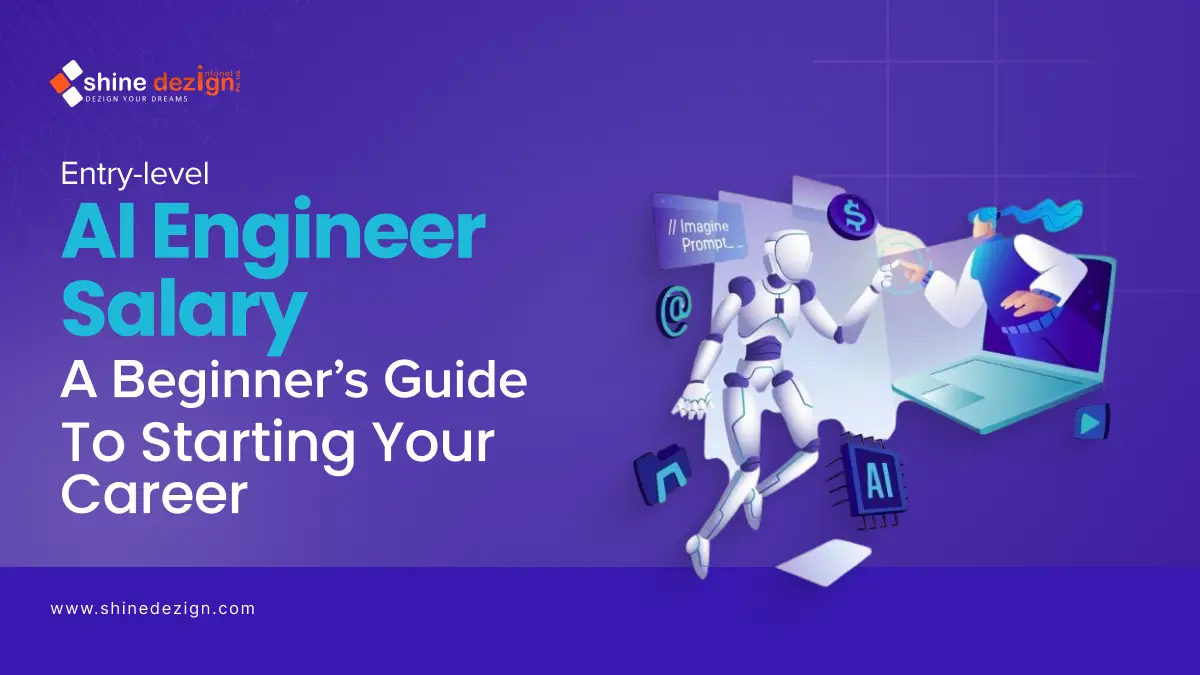Are you looking to start your career as an AI engineer, or do you want to know about an AI engineer’s salary? Whether you come from a computer science background, have completed a specialized bootcamp, or are looking to upskill your career as an AI engineer. In this article, we will explore how much a beginner AI engineer earns and how you can kickstart your career.
What is AI Engineering?
AI engineering is the practice of applying structured engineering approaches to the creation, development, and deployment of artificial intelligence systems. It blends expertise from computer science, software engineering, and data science to craft intelligent solutions that can adapt, learn, and act.
From powering chatbots and self-driving cars to enabling predictive maintenance tools, AI engineering focuses on building smart technologies that process data, make informed decisions, and assist humans in performing complex tasks.
Artificial Intelligence (AI) engineering refers to applications where machines replicate human abilities, such as problem-solving and learning. By processing large volumes of data, algorithms are “trained” to improve their performance and deliver more accurate results over time.
Also approx. 75% of businesses are planning to include AI by 2027. (Source: Statista) This means the opportunities for an AI engineer will rise in the upcoming years.
Role of an AI Engineer:
AI engineer plays a vital role in businesses that utilize artificial intelligence. They chart an AI strategy and define the problems to be solved with AI. They are responsible for implementing and building AI development and production infrastructure.
Here are some of an AI Engineer’s Particular Tasks and Responsibilities
- Manage AI development and production infrastructure.
- Perform statistical analysis to support data-driven decisions.
- Automate infrastructure for data science workflows.
- Build AI models and support implementation with stakeholders.
- Deploy ML models as APIs for seamless integration.
- Collaborate with teams to drive AI adoption and best practices.
How much do AI Engineers Earn?
An AI engineer’s salary depends on various factors that include qualification, experience, and industry. As per Glassdoor, the entry-level salary of an AI engineer in India starts from the range of ₹6L to ₹13.8L/yr. However, the range of AI engineer salaries varies depending on the level of experience.
Salaries of AI Engineers in India
| Experience | Salary |
| 0-1 Years | ₹6L to ₹13.8L/yr |
| 1-3 Years | ₹6L to ₹14.0L/yr |
| 4-6 Years | ₹8L – ₹18.5L/yr |
| 7-9 years | ₹10.0L – ₹24.8L/yr |
| 10-14 years | ₹11.7L – ₹35.0L/yr |
| 15+ years | ₹96K – ₹1L/mo |
Key Factor that Impacts AI Engineer Salaries
Let’s examine the key factors influencing the salaries of AI engineers.
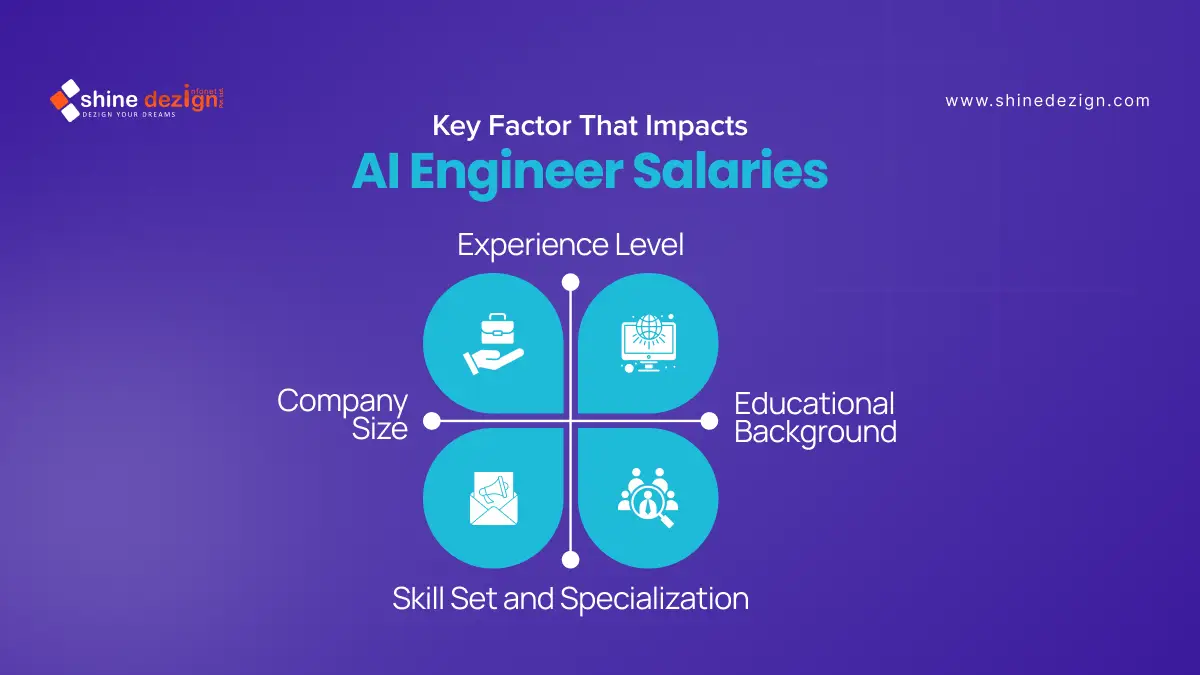
1. Experience Level:
Entry-level engineers typically begin with modest packages as they develop foundational skills, whereas mid-level professionals with proven expertise in model deployment and business problem-solving experience a noticeable increase in compensation. Senior engineers and leads, who manage teams, design architectures, and guide strategic AI adoption, take the highest salaries.
2. Educational Background:
Another vital factor is the educational background. While a bachelor’s degree in computer science or related fields is typically sufficient for entry, those with master’s or Ph.D. degrees in data science, AI, or machine learning mostly earn more, especially in research-focused businesses.
3. Skill Set and Specialization:
The skill set and specialization of an AI engineer also significantly impact salary earnings. Expertise in high-demand areas like natural language processing, deep learning, computer vision, reinforcement learning, or cloud-based AI platforms can substantially increase salary potential. Similarly, the industry and domain where an engineer works make a difference.
4. Company Size:
Company size also shapes salary expectations. Tech giants like Microsoft, Amazon, Google, and Meta mostly pay more than mid-sized firms or consultancies, while startups may trade lower salaries for equity or career acceleration. Moreover, the location remains another deciding factor; AI engineers in high-tech cities like Chandigarh, Bangalore, Hyderabad, and Pune often earn significantly more than their counterparts.
Top Companies Hiring AI Engineers in India
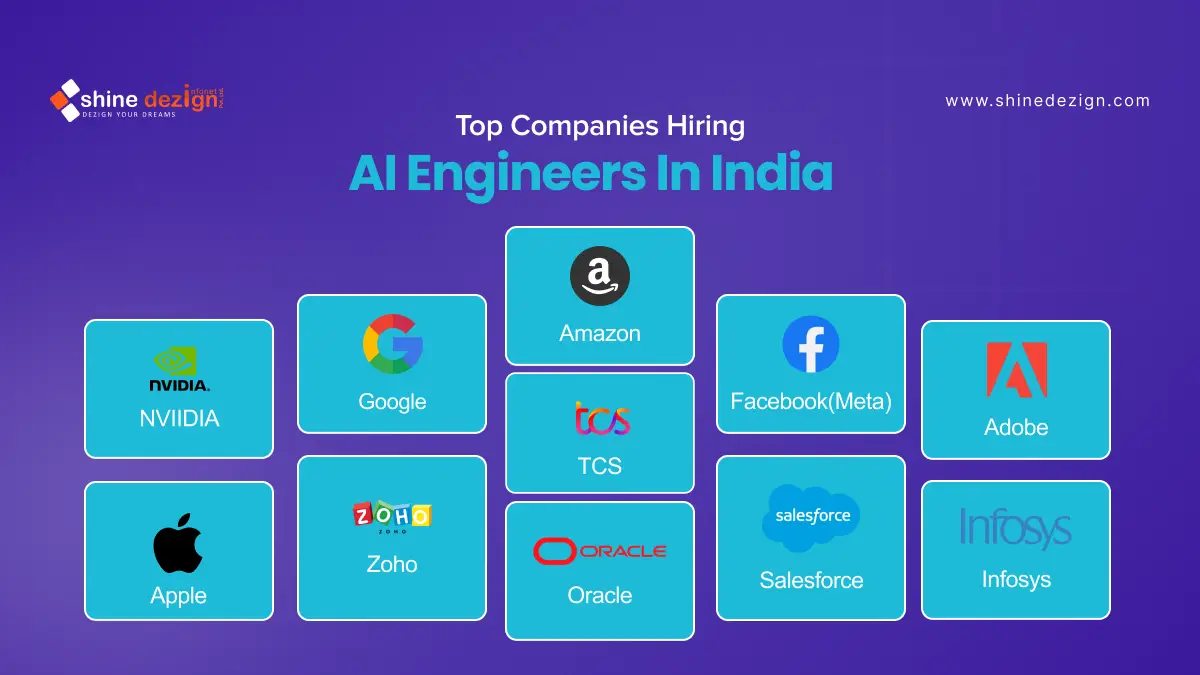
| NVIIDIA | Amazon | ||
| Apple | Zoho | Oracle | Salesforce |
| Adobe | Infosys | TCS | Microsoft |
How to Become an AI Engineer?
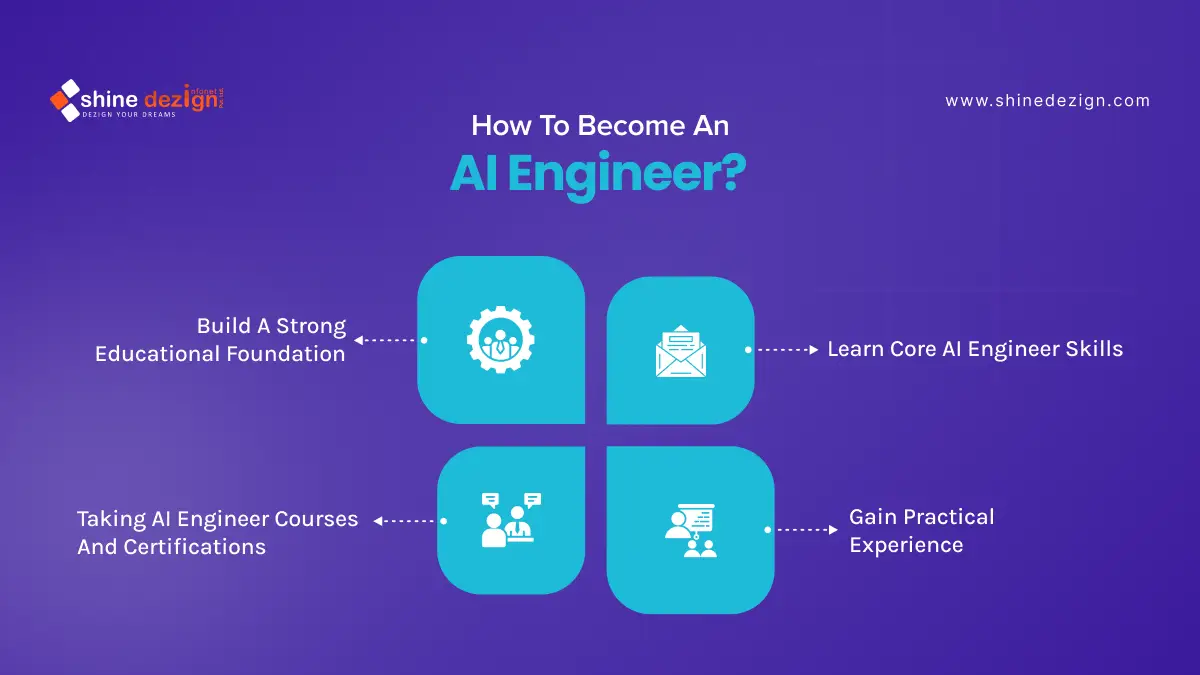
1. Build a Strong Educational Foundation
The journey toward becoming an AI engineer begins with education. While a bachelor’s degree in computer science, mathematics, or data science provides a strong starting point, it is no longer a strict requirement.
Many professionals are entering the field through self-paced online courses and bootcamps. Regardless of the path, it is essential to develop a deep understanding of mathematics, particularly linear algebra, probability, and statistics, as these subjects form the backbone of machine learning and artificial intelligence.
2. Learn Core AI Engineer Skills
After establishing a foundation, the next step is to gain technical expertise. Python remains the most widely used programming language in AI, though languages such as R, Java, and C++ are also valuable in specific applications. Beyond coding, aspiring AI engineers need to become familiar with machine learning and deep learning frameworks like TensorFlow, PyTorch, and Scikit-learn.
Working with data is equally critical, which is why proficiency in data handling, cleaning, and analysis is essential. As you advance, exploring areas like natural language processing, computer vision, and cloud platforms such as AWS or Google Cloud will make you industry-ready.
3. Taking AI Engineer Courses and Certifications
Structured learning can accelerate your career progress. Online platforms such as Coursera, Udemy, and edX offer beginner-friendly as well as advanced AI programs. These courses not only help in building technical knowledge but also in earning certifications that employers value. Programs designed by leading universities and industry experts ensure that you gain both theoretical insights and practical skills needed for professional growth.
4. Gain Practical Experience
Artificial intelligence is a hands-on discipline, which means practical exposure is just as significant as theoretical knowledge. Internships allow you to work on real-world problems, collaborate with professionals, and understand how businesses integrate AI into their operations.
For beginners, opting for structured training programs can make a big difference. For instance, six-week or six-month internship programs, such as those offered by Shine Dezign in AI/ML, provide the right balance of learning and application, helping beginners transition smoothly from theory to practice.
Must have Skills for Entry-level AI Engineers
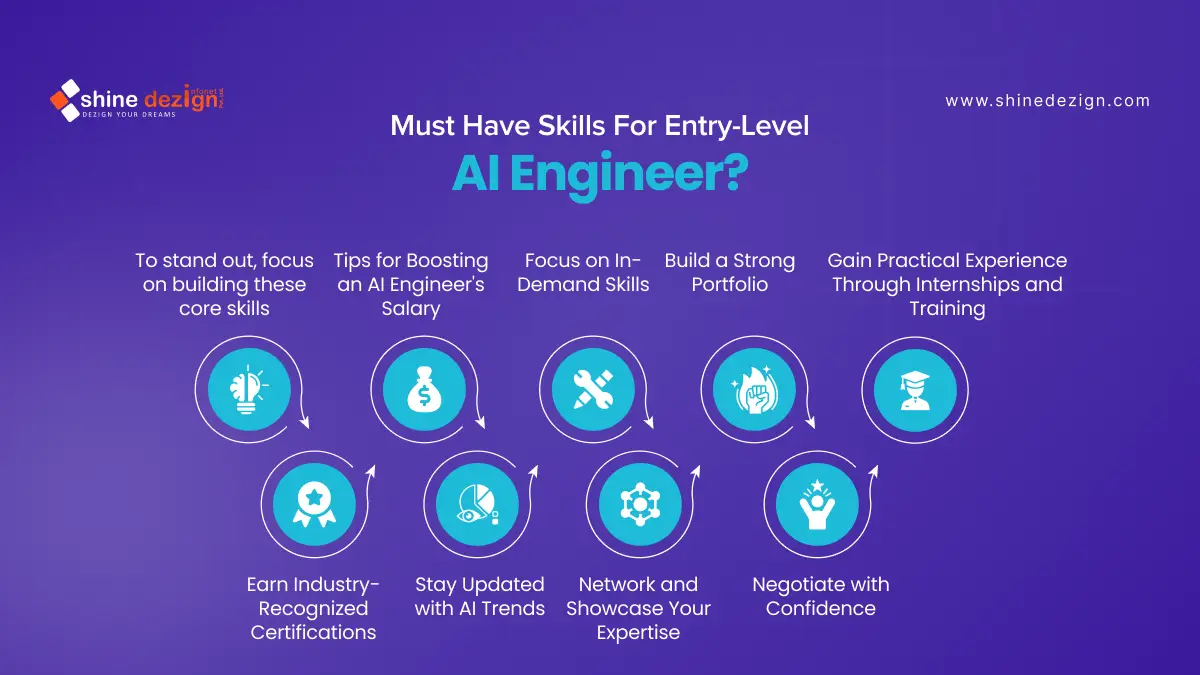
1. To Stand out, Focus on Building these Core Skills
- Programming Languages: Python, R, C++
- Machine Learning & Deep Learning: TensorFlow, PyTorch, Scikit-learn.
- Mathematics & Statistics: Linear algebra, probability, optimization.
- Data Handling: SQL, Pandas, NumPy.
- Cloud Computing: AWS, GCP, Azure.
- Version Control & Collaboration: Git, GitHub
- Generative AI
- MLOps & Deployment
2. Tips for Boosting an AI Engineer’s Salary:
Breaking into the AI industry is an achievement in itself, but once you land your first role, the next step is to maximize your earning potential. Salary growth in this field depends on more than just technical skills; it’s about continuous learning, specialization, and demonstrating the ability to deliver business impact.
3. Focus on In-Demand Skills:
Employers are willing to pay more for AI engineers who master high-demand skills such as deep learning, natural language processing, computer vision, and cloud-based AI deployment. Expanding your expertise beyond the basics of machine learning into advanced domains can help you stand out from other candidates and command a higher salary.
4. Build a Strong Portfolio:
In AI, your portfolio is as important as your resume. A well-documented GitHub profile filled with real-world projects ranging from chatbots and recommendation systems to predictive analytics and image recognition models proves your ability to apply knowledge in practical scenarios. The stronger your portfolio, the more negotiating power you’ll have when discussing compensation.
5. Gain Practical Experience Through Internships and Training:
Practical experience plays a significant role in salary growth, especially in the early stages of your career. Internships and training programs allow you to apply theoretical knowledge to real-world challenges. Completing structured programs, such as six-week or six-month AI/ML internships like those offered by Shine Dezign, not only boosts confidence but also helps you secure higher-paying roles faster by demonstrating hands-on expertise.
6. Earn Industry-Recognized Certifications:
Certifications act as proof of your knowledge and commitment to growth. Employers often prefer candidates who have specialized certifications from platforms like Coursera, edX, or cloud providers such as AWS and Microsoft Azure. These credentials validate your skills and can lead to better job offers and salary increments.
7. Stay Updated with AI Trends:
The AI industry evolves at lightning speed. By staying up to date with the latest frameworks, research papers, and tools, you position yourself as a forward-thinking engineer. Introducing new technologies to your team or suggesting innovative applications can make you more valuable to your employer, thereby strengthening your case for salary increases.
8. Network and Showcase Your Expertise:
Networking can also have a direct impact on your salary. Engaging in AI communities, attending tech conferences, and publishing blogs or research on platforms like LinkedIn establishes your authority in the field. Employers are more inclined to offer competitive pay to engineers who are visible in the professional community and known for sharing their expertise.
9. Negotiate with Confidence:
Finally, never underestimate the power of negotiation. Many entry-level professionals accept the first offer without realizing that salaries are often negotiable. If you can back your request with solid achievements, certifications, or project work, you will be in a stronger position to secure a better compensation package.
Summing up
Breaking into the field of AI engineering may seem challenging, but with the right mix of education, practical training, and persistence, it becomes an achievable goal. Entry-level salaries are already attractive, and they grow significantly as you gain expertise and industry experience.
The most effective way to start is by building a solid foundation in programming, machine learning, and data handling, while also taking advantage of internship opportunities such as 6-week or 6-month training programs offered by companies like Shine Dezign. These hands-on experiences not only enhance your technical skills but also give you the industry exposure needed to stand out.
Your questions, our answers
Yes. Internships are a crucial step for gaining real-world experience. Programs like 6-week or 6-month AI/ML internships at companies such as Shine Dezign help freshers strengthen their skills, build portfolios, and improve hiring chances.
Core skills include Python programming, machine learning, deep learning, data analysis, SQL, and cloud computing. Knowledge of frameworks like TensorFlow, PyTorch, and Scikit-learn is also highly valuable.
While a degree in computer science, AI, or data science is beneficial, many companies now prioritize practical skills, certifications, and hands-on projects over formal education.
You can boost your salary by upskilling with advanced certifications, contributing to open-source projects, building AI models, and working on industry-specific applications like healthcare AI, fintech AI, or NLP.
With experience, AI engineers can move into roles such as Machine Learning Engineer, Data Scientist, AI Researcher, or AI Architect.

